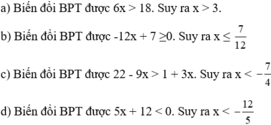Hãy nhập câu hỏi của bạn vào đây, nếu là tài khoản VIP, bạn sẽ được ưu tiên trả lời.

Bài 1:
a) (3x - 2)(4x + 5) = 0
<=> 3x - 2 = 0 hoặc 4x + 5 = 0
<=> 3x = 2 hoặc 4x = -5
<=> x = 2/3 hoặc x = -5/4
b) (2,3x - 6,9)(0,1x + 2) = 0
<=> 2,3x - 6,9 = 0 hoặc 0,1x + 2 = 0
<=> 2,3x = 6,9 hoặc 0,1x = -2
<=> x = 3 hoặc x = -20
c) (4x + 2)(x^2 + 1) = 0
<=> 4x + 2 = 0 hoặc x^2 + 1 # 0
<=> 4x = -2
<=> x = -2/4 = -1/2
d) (2x + 7)(x - 5)(5x + 1) = 0
<=> 2x + 7 = 0 hoặc x - 5 = 0 hoặc 5x + 1 = 0
<=> 2x = -7 hoặc x = 5 hoặc 5x = -1
<=> x = -7/2 hoặc x = 5 hoặc x = -1/5

a) 3x-2=2x-3
3x=2x-1
Bớt mỗi vế 2x
x=-1
b)3-4y+24+6y=y+27+3y
3-4y+6y=y+3+3y
3-4y+3y=y+3
<=> y=0
c.7-2x=22-3x
2x=15-3x
15=x
d.8x-3=5x+12
3x-3=12
3x=15
x=5
câu e hình như bạn thiếu đề
f)x+2x+3x-19=3x+5
6x-19=3x+5
3x-19=5
3x=24
<=>x=8
g)11=8x-3=5x-3+x
11=8x-3
11=6x-3
<=> x không tồn tại
h)4-2x+15=9x+4x-2x
4-2x+15=11x
<=> nghiệm trên có số thập phân vô hạn tuần hoàn nhé
T
Ngập mặt ~
Mình làm 1;2 câu thôi. Các câu sau bạn làm tương tự nhé.
a/ 3x - 2 = 2x - 3
<=> 3x - 2 - 2x + 3 = 0
<=> x + 1 = 0
<=> x = -1
b/ 3 - 4y + 24 + 6y = y + 27 + 3y
<=> 3 - 4y + 24 + 6y - y - 27 - 3y = 0
<=> -2y = 0
<=> y = 0

a: =>-x+2x=3-7
=>x=-4
b: =>6x+2+2x-5=0
=>8x-3=0
hay x=3/8
c: =>5x+2x-2-4x-7=0
=>3x-9=0
hay x=3
d: =>10x2-10x2-15x=15
=>-15x=15
hay x=-1

bạn đăng tách cho mn cùng giúp nhé
Bài 1 :
a, \(\Leftrightarrow11-x=12-8x\Leftrightarrow7x=1\Leftrightarrow x=\dfrac{1}{7}\)
b, \(\Leftrightarrow2x\left(x^2+4x+4\right)-8x^2=2\left(x^3-8\right)\)
\(\Leftrightarrow2x^3+8x^2+8x-8x^2=2x^3-16\Leftrightarrow x=-2\)
c, \(\Leftrightarrow3-2x=-x-4\Leftrightarrow x=7\)
d, \(\Leftrightarrow x^3-6x^2+12x-8+9x^2-1=x^3+3x^2+3x+1\)
\(\Leftrightarrow3x^2+12x-9=3x^2+3x+1\Leftrightarrow x=\dfrac{10}{9}\)
e, \(\Leftrightarrow2x^2-x-3=2x^2+9x-5\Leftrightarrow x=5\)
f, \(\Leftrightarrow x^3-3x^2+3x-1-x^3-2x^2-x=10x-5x^2-11x-22\)
\(\Leftrightarrow-5x^2+2x-1=-5x^2-x-22\Leftrightarrow3x=-21\Leftrightarrow x=-7\)

1) (2x + 1)(3x – 2) = (5x – 8)(2x + 1)
⇔ (2x + 1)(3x – 2) – (5x – 8)(2x + 1) = 0
⇔ (2x + 1).[(3x – 2) – (5x – 8)] = 0
⇔ (2x + 1).(3x – 2 – 5x + 8) = 0
⇔ (2x + 1)(6 – 2x) = 0
⇔\(\left[{}\begin{matrix}2x+1=0\\6-2x=0\end{matrix}\right.\) ⇔ \(\left[{}\begin{matrix}x=\dfrac{-1}{2}\\x=3\end{matrix}\right.\)
Vậy.....
2) 4x2 -1 = (2x + 1)(3x - 5)
⇔ (2x-1)(2x+1)-(2x+1)(3x-5)=0
⇔ (2x+1)(2x-1-3x+5)=0
⇔ (2x+1)(4-x)=0
⇔ \(\left[{}\begin{matrix}2x+1=0\\4-x=0\end{matrix}\right.\) ⇔ \(\left[{}\begin{matrix}x=\dfrac{-1}{2}\\x=4\end{matrix}\right.\)
Vậy...
3)
(x + 1)2 = 4(x2 – 2x + 1)
⇔ (x + 1)2 - 4(x2 – 2x + 1) = 0
⇔ x2 + 2x +1- 4x2 + 8x – 4 = 0
⇔ - 3x2 + 10x – 3 = 0
⇔ (- 3x2 + 9x) + (x – 3) = 0
⇔ -3x (x – 3)+ ( x- 3) = 0
⇔ ( x- 3) ( - 3x + 1) = 0
⇔\(\left[{}\begin{matrix}x-3=0\\-3x+1=0\end{matrix}\right.\) ⇔\(\left[{}\begin{matrix}x=3\\x=\dfrac{1}{3}\end{matrix}\right.\)
Vậy......

a: =>17x-5x-15-2x-5=0
=>10x-20=0
=>x=2
b: =>\(\dfrac{3x-6-5x-10}{\left(x+2\right)\left(x-2\right)}=\dfrac{11x+23}{\left(x+2\right)\left(x-2\right)}\)
=>11x+23=-2x-16
=>13x=-39
=>x=-3(nhận)
c: =>5x+7>=3x-3
=>2x>=-10
=>x>=-5
d: =>5(3x-1)=-2(x+1)
=>15x-5=-2x-2
=>17x=3
=>x=3/17
e: =>4x^2-1-4x^2-3x-2=0
=>-3x-3=0
=>x=-1
g: =>7x-5-8x+2-7<0
=>-x-10<0
=>x+10>0
=>x>-10

a: =>17x-5x-15-2x-5=0
=>10x-20=0
=>x=2
b: =>\(\dfrac{3x-6-5x-10}{\left(x+2\right)\left(x-2\right)}=\dfrac{11x+23}{\left(x+2\right)\left(x-2\right)}\)
=>11x+23=-2x-16
=>13x=-39
=>x=-3(nhận)
c: =>5x+7>=3x-3
=>2x>=-10
=>x>=-5
d: =>5(3x-1)=-2(x+1)
=>15x-5=-2x-2
=>17x=3
=>x=3/17
e: =>4x^2-1-4x^2-3x-2=0
=>-3x-3=0
=>x=-1
g: =>7x-5-8x+2-7<0
=>-x-10<0
=>x+10>0
=>x>-10

a, (3x - 1)(5x + 3) = (2x + 3)(3x - 1)
⇔ 5x + 3 = 2x + 3
⇔ 3x = 0
⇔ x = 0
Vậy phương trình có nghiệm là x = 0
Mình làm lại rồi nhé!
a, (3x - 1)(5x + 3) = (2x + 3)(3x - 1)
⇔ 5x + 3 = 2x + 3
⇔ 3x = 0
⇔ x = 0
Vậy phương trình có nghiệm là x = 3.